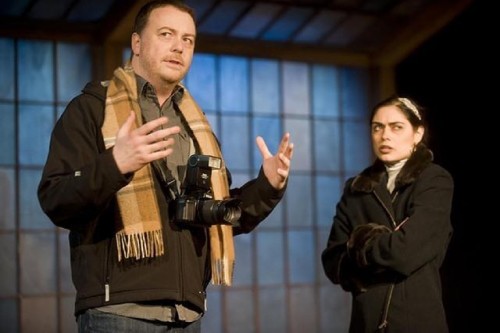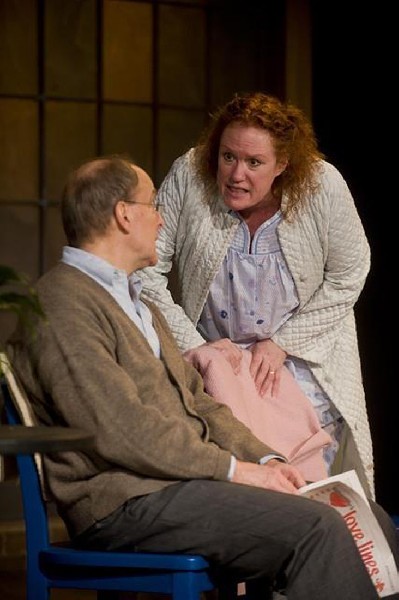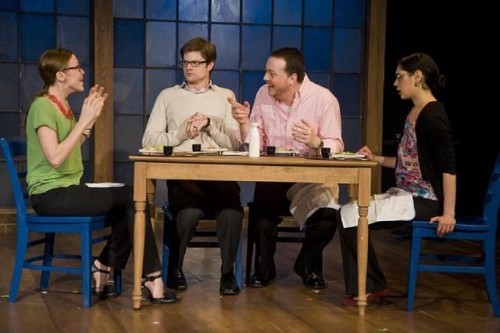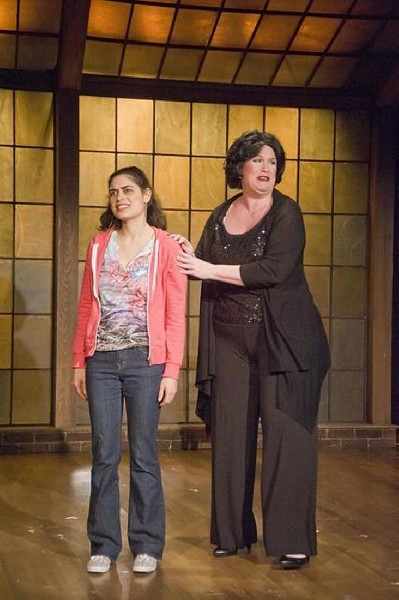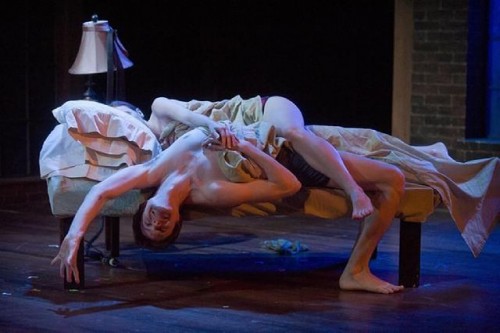Barrington’s 10x10 is a Ten
A Winter Buffet of Theatre in Pittsfield
By: Charles Giuliano - Feb 20, 2012
10x10
Barrington Stage Company
Pittsfield, Mass.
February 16 through 26
Program
“God in the Goat” by Suzanne Bradbeer. On a stoop in New York City, a member of the paparazzi starts a conversation with an old girlfriend of the celebrity who recently passed away in the building across the street. With Lily Balsen and Matt Neely; Directed by Frank La Frazia.
“Another Cup of Coffee” by Cait Weisensee. A man cares for his wife, who is suffering from a degenerative brain disease and cannot remember the facts—big or small— from moment to moment. With Robert Zukerman, Peggy Pharr Wilson and Emily Taplin Boyd; Directed by David Sernick.
“Tenderness” by Maureen McGranaghan. A young woman wakes up in the middle of the night, to find the man she had just slept with sneaking away. With Emily Taplin Boyd and Ryland Thomas; Directed by Tom Gladwell.
“The Story” by Mikhail Horowitz. In an absurdist scene, two men in a cave discuss how to tell a good story. With Robert Zukerman and Matt Neely; Directed by Mark St Germain.
“Lannie’s Lament” by Jacqueline Goldfinger. A Southern Gothic tale about Little Lannie and a funeral. With Peggy Pharr Wilson; Directed by Mark St Germain.
“Things I Left on Long Island” by Sara Cooper. A young woman moves back home to Long Island to live with her mother, grandmother and younger brother. With Lily Balsen, Peggy Pharr Wilson and Robert Zukerman; Directed by Julianne Boyd.
“Lunch with Amanda” by Chris Newbound. A man seeks out a woman at lunch after he accidentally hits her with a softball during a company game. With Lily Balsen and Ryland Thomas; Directed by Frank La Frazia
“Behold the Coach, In a Blazer, Uninsured” by Pulitzer Prize finalist Will Eno. A sports coach, in a press conference, reckons with winning, losing, and certain areas of the Universe. With Matt Neely; Directed by Mark St. Germain.
“Total Expression” by Marisa Smith. An American woman gets some unexpected advice from a Russian model. With Emily Taplin Boyd, Peggy Pharr Wilson and Robert Zukerman; Directed by Tom Gladwell.
“Fugu” by Laura Shaine. Two couples meet as part of an ongoing culinary rivalry as to which couple can prepare the most obscure haute gourmet dinner. Matt Neely, Lily Balsen, Emily Taplin Boyd, and Ryland Thomas; Directed by Julianne Boyd.
10x10 which presents ten new ten minute plays by ten playwrights for ten days adds up to a winner for Barringon Stage Company.
During a relatively mild winter this refreshing program feels like Spring.
The imaginative concept of 10x10 on North Street presents a city wide arts festival for Pittsfield. It nicely conflates with Barrington’s mandate to promote vibrant new theatre as well as stay in touch with the Berkshire audience during the hibernation of the oh so long off season.
Significantly, of the ten playwrights only two have previously had their work produced at Barrington Stage. It is a wonderful opportunity providing vital exposure for their creative efforts. But it was also a great experience for the audience to have a program of such tasty and varied theatrical appetizers.
The experience provided a series of variations and meditations on a standard increment of time. Through the individual works there was a dichotomy between how long will this last or when will it end? Depending on what we are experiencing ten minutes can seem all too brief and tantalizing or excruciatingly interminable.
The challenge it to establish characters, a plot or situation with the greatest possible focus and economy of means. It is the norm for television and the sketches of a variety show like Saturday Night Live. But a relatively uncommon experience in theatre.
There is also the issue of whether the ten minute play is complete and resolved as a stand alone experience. A kind of theatrical Haiku. Or, does the brief sequence suggest an excerpt or pull out, a trailer for a longer and more complete work?
Given the pace and intensity of the program one barely has time to absorb and respond to one vignette before we are exposed to another. There is another paradigm in adapting our responses to an individual actor in one segment and then encountering a completely different character and persona in another.
We emerge from the theatre having enjoyed a wonderfully compact and rewarding experience but with a blur of impressions. It is challenging enough for a critic to review one play but the degree of difficulty ratchets up exponentially when dealing with ten.
Which is why we have posted the cheat sheet above. It makes life easier for the reader as well as for the critic.
The easy way out is to praise everything and applaud the overall experience. But of course that’s not true. There is no way that ten different experiences are uniformly wonderful. But to sort through all ten works and line them up in some kind of logical order is equally impossible. One might knock them off in order of appearance and have an egalitarian sentence or two on each. That might be fair but a lot of work and perhaps boring.
It is also worth commenting that when taking in a lot of information within a limited span of time memory tends to be capricious. Some of the short plays take a daunting effort to recall in detail while with others the experience was sharper and more indelible.
“Another Cup of Coffee” by Cait Weisensee left a deep and lingering impact. Not saying that it was the “best play” of the group but the theme of loss and memory resonated deeply. Perhaps that is reflection on the age of the critic and the degree to which the issue and theme was poignant and sadly familiar.
A younger person, for example, might strongly identify with “Tenderness” by Maureen McGranaghan. But the situation of wanting to slip out in the middle of the night having had sex with a stranger is just way too far back in my rear view mirror. Been there done that so the topic wasn’t particularly compelling.
I’m not Jewish. I graduated from a Jewish University. Some of my best friends are Jewish. So yes, “Things I Left on Long Island” by Sara Cooper was funny. But not that funny and broadly overstated in evoking every possible comic cliché about having a Jewish mother. In our after theatre dialogue it seemed that this sketch had the potential to be developed into a full length comedy.
A colleague who happens to be Jewish stated that it reminded him of his own family. Which is why he liked it.
He didn’t like “Behold the Coach, In a Blazer, Uninsured” by Pulitzer Prize finalist Will Eno. But conceded that the audience seemed to enjoy the play. Me too. Lots. I suspect the critic doesn’t enjoy sports on TV. I do. tons.
So that crazy, non sequitur post game speech, for me, was just hilarious. In the performance by Matt Neely I kept channeling the post game, dead pan remarks of coach Bill Belichik of the Patriots. Who squirms in the manner of theatre of the absurd particularly when commenting on games he looses. For sports fans Eno’s pithy character will ring all too true.
I struggled to stay awake through “The Story” by Mikhail Horowitz. “It was a dark and windy night when the captain said to the mate, mate, tell me a story.” This is a bit I have done myself perhaps too often. So knowing the gag inside out and seeing it acted out on stage was like watching paint dry. It was the longest ten minutes of the evening.
Are you catching the drift here or how personal it gets. In no way is writing theatre criticism an exact science. Arguably, there might be thousands of responses to the ten plays.
In “Total Expression” by Marisa Smith we totally enjoyed another side of Emily Taplin Boyd. Here she was wonderful as a Russian “model” in thigh high hooker boots. She managed instantly to create an indelible character in a sketch that we would love to see expanded. She and Peggy Pharr Wilson, as a middle aged housewife during a chance encounter at a mall, play off of each other deliciously. The fancy boots it seems were a gift from her lover, a married man, who enjoys her special oral talents. Comically when Wilson’s husband (Robert Zukerman) shows up she whispers to him that if she gives him a happy ending he might buy her those coveted boots.
Special mention to Barrington veteran Peggy Pharr Wilson. With the clever use of two wigs, in addition to her own hair, and costume changes she managed to create four distinct and brilliant characters. She greatly contributed to the success of the program. She was just stunning in the monologue “Lannie’s Lament” by Jacqueline Goldfinger. The bit about eating the dead man’s nose was outrageous. You had to be there.
Based on audience reaction the hit of the program was “Fugu” by Laura Shaine. As an avid foodie I found this comic sketch most delicious. It may have been a bit obvious but it was nicely resolved in just ten minutes.
By contrast “God in the Goat” by Suzanne Bradbeer never got into gear. The whole thing about God in a cashmere scarf was way over my head. That and the back story about how the girl early on dated the dead rock star. There were just too many holes and this play needs a ton of work.
“Lunch with Amanda” by Chris Newbound left me completely flat. What was that all about? Haven't a clue. Barely remember it.
For better or worse I have managed to say at least something about all of the plays. Leaving out tons of detail.
But overall not a bad review.
Considering.
That I wrote it in just ten minutes.

